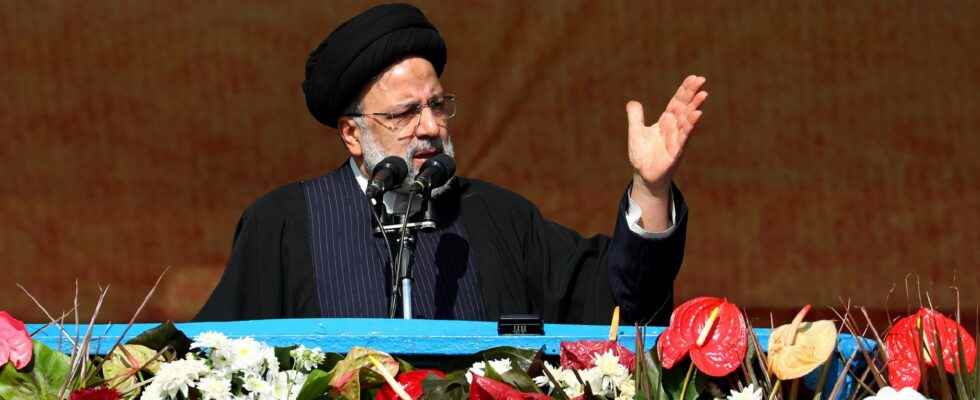Sitting to the left of the first lady of Iran, the wife of the Prime Minister of Burkina Faso seems to Tehran like a fish in water, on January 20, 2023. In the midst of a popular revolt against the oppression of women by the mullahs’ regime, she is the guest of a curious event: the “first Congress of influential women”. The same day, her husband welcomed the Iranian Deputy Foreign Minister to Ouagadougou. A handshake in front of the cameras and this announcement to seal the rapprochement: the Islamic Republic will soon appoint an ambassador to the capital of “Faso”. In neighboring Mali, the idyll is more advanced. The head of diplomacy, Abdoulaye Diop, went to Tehran on February 14, 2022 for a “working and friendship visit”. Six months later, he welcomed his counterpart to Bamako and advocated a “win-win partnership”.
In these two Sahelian states led by a junta and plagued by terrorism, Iran is advancing its pawns. “The rejection of France and the West in the region creates an ideological opening for the Islamic Republic”, notes Clément Therme, associate researcher at the International Institute of Iranian Studies and professor at Sciences Po Paris. Like Moscow, Tehran has well understood the interest of surfing on this anti-imperialist wave to win allies, also under international sanctions. A club of pariah states, in short.
Plans to attack diplomats
“Contrary to the Iranian moderates, who favored rapprochement with the West, particularly within the framework of the nuclear agreement, the conservatives, like the current president Ebrahim Raïssi, play on third-world solidarity to seduce the non-aligned African countries, continues Clément Therme.
The key is diplomatic support in international bodies, at the United Nations General Assembly or within the International Atomic Energy Agency, which is essential with regard to the Iranian nuclear program. “Iran also has economic and strategic motivations, explains Eric Lob, independent researcher at the Middle East Institute (in Washington): several African countries, such as Algeria and South Africa, have reserves of uranium and In addition, Iran’s agricultural sector, which is quite large (nearly 13% of GDP in 2021, editor’s note), is sorely lacking in water, so the regime is seeking to conclude agreements with African countries to practice offshore agriculture. .”
The Islamic Republic is also advancing its security agenda on the continent. “She sees Africa as a field of confrontation at a distance with her rivals: Saudi Arabia, the United Arab Emirates, Israel and the United States” adds Clément Therme. In latent conflict with the Americans since 1979, the regime has not digested the elimination of one of its caciques, Qassem Soleimani, killed in an American strike in Baghdad. At the time, the authorities had promised “revenge of the blood of the martyr”.
Africa could be the unexpected scene. In September 2020, American intelligence alerted to a plan to assassinate the United States ambassador to South Africa. The following year, 15 people were arrested in Ethiopia, accused of fomenting a plot against Emirati diplomats. The American secret services suggest that Tehran could aim for other targets, elsewhere in Africa… by relying on influential relays. Because the Iranian presence is not new on the continent. The country that defends Shiite Islam (a minority in Africa) has opened “cultural centers” there infiltrated by the Revolutionary Guards, and financed schools and clinics. In West Africa, he cultivates his ties with Lebanese Shiite communities, particularly in Côte d’Ivoire and Senegal. In Nigeria, his religious proselytism encouraged the conversion to Shiism of hundreds of thousands of faithful. Finally, Iran maintains long-standing commercial and diplomatic relations with South Africa.
Standoff with Saudi Arabia
As for its recent interest in the Sahel, it hides another ambition, according to Eric Lob, independent researcher at the Middle East Institute (in Washington): “The government is seizing an opportunity to show other countries that it can be a partner reliable.” In its sights, the Horn of Africa, this strategic region located in the east of the continent, where Iran has lost influence in recent years, to the benefit of its great rival, Saudi Arabia Riyadh has invested heavily in Djibouti, Somalia and Eritrea to support its war effort in neighboring Yemen, where it maintains power in the face of Houthi rebels aided by Tehran.
At the heart of this competition between the two enemy brothers of the Middle East, the control of the Red Sea, trade and energy corridor of the utmost importance. Regaining ground will not be easy for Iran. In great economic difficulty, the regime nevertheless has a secret weapon: its formidable kamikaze drones. Delivered in industrial quantities to Russia since the start of the war in Ukraine, these small aircraft had been talked about a year earlier, in the midst of the civil war in Ethiopia. A “key factor” against the rebels in Tigray (in the north), according to a report by the International Crisis Group. On a continent where hotbeds of insecurity are multiplying, drone diplomacy may have a bright future ahead of it.
